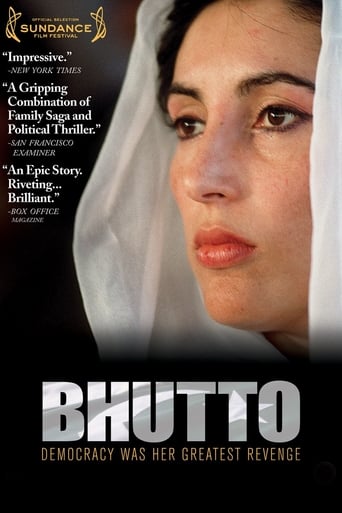David Lewis
I attended a screening of Bhutto at Montana State University in October, 2012, and a discussion that followed with producer Mark Seigel. The first question posed by a young man after the conclusion of the film said a lot. Inspired by an underlying message in the film, he proposed a scenario in which problems in Pakistan were a result of American foreign policy. Seigel immediately affirmed that point of view in his response, and at the outset of his talk made a reference to Mitt Romney that seemed out of place. Seigel is a hard core Democrat, having served as Executive Director of the Democratic National Committee, and this may be important to a few key assertions in the documentary that stem from ideology rather than history. Bhutto is worth watching and provides plenty of biographical background on one of the most fascinating and courageous leaders of modern times. One wishes though that erroneous assertions that have little to do with her life were omitted, such as the urban legend that the U.S. backed Osama Bin Laden in Afghanistan in the 1980s during the days of the Soviet invasion and occupation. That is simply false. Bin Laden was a Saudi, with Saudi money, and was probably not even physically in Afghanistan in those days, but in Pakistan, and not part of the indigenous Afghan non-Arab fighting force that the US was supporting. The film though shows Bin Laden, using much later footage, in that context, as if from Afghanistan in the 80s—a blatant deception. Simple fact checking would have dissuaded an objective filmmaker from including this bit of nonsense in the production, and I include this assessment as a former associate of the Committee for a Free Afghanistan who spent time with Zia Massoud in the mid 80s, brother of Ahmad Shah Massoud (the Afghan national hero assassinated by al-Qaeda in a suicide bombing on September 9, 2001, two days before the September 11 attacks that caused the US to intervene in Afghanistan.) His brother, Zia, became the first acting vice president of Afghanistan under Karzai. The film leads viewers to believe that the US supported the most "radical anti-western forces in Afghanistan," as Seigel himself stated in the discussion (rather than Massoud, his fighters, and the like), ridiculing Ronald Reagan for having compared freedom fighters we did support to George Washington, a reasonable comparison given Massoud's legendary status (he was called the Lion of the Panshir), his pro-Western stance, and the fact that he was assassinated immediately before 9-11 so as not be employed by the US in retaliation. Had he lived, he may have become the leader of Afghanistan after 9-11 (and so his brother become acting vice president instead, a man I briefly knew in the mid 80s). It seemed though that Seigel, while billed as an expert on Pakistan, either knows little about Afghanistan, while making it an important part of the film, or chose to simply distort in ways that suits his political leanings. The film also infers that America was to blame in the assassination of Bhutto, by selectively including the assertion of one protesting group in the aftermath of the assassination, as translated by Tariq Ali, a long time partisan against US foreign policy (the film does include comments by Condaleeza Rice, but not concerning these issues). Further, the film seems to prod viewers toward the ideological presumption that if only America would stop working with dictators, things would work out much more nicely in the world (hence the impressionable young man's question at the outset of the discussion), when, in fact, realistically, the world is full of dictators and it would be quite a trick to enlist their cooperation while insisting that they give up power (witness Mubarak in Egypt, a scenario that ended in disaster for American interests, or other dictators removed from power and then the utterly destabilized aftermath: Yugoslavia, Libya, etc). And so, I attended this film with two Muslim women (family members by marriage), hoping they would find in Benazir Bhutto a figure they could look to for inspiration, and I'm sure the film accomplished that to some degree, for it adequately chronicles her life, imprisonment, and heartbreaking trials, but it fails in other ways. Particularly telling was the producer's inclusion of his own weeping when being interviewed, as he recalled the tragic assassination. We certainly can't fault him for such feelings of grief, but to deliberately and conspicuously include such a scene in the film seems the height of self-indulgence, showing us his ability "to feel," when a more appropriate course of action, it seems, would been to have grieved in private, as opposed to having exploited that expression on film. It was really quite strange (although consistent with the "bleeding heart liberal" psychology) to see a producer presenting a film in which he, himself is choking on his tears, knowing that he is responsible for the production of the film, and so the word "self-indulgent comes to mind. Nor was he, apparently, able to separate his own political feelings from a film that should have been an homage to a truly great woman. That was why I attended, to behold such an homage, and so that two Muslim women living in the US could as well (and that was to some degree accomplished), not so that they would be induced to believing that America is always to blame.

